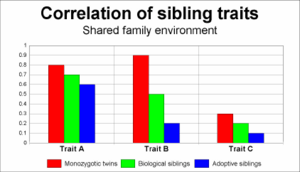Nature versus nurture facts for kids

The nature versus nurture idea talks about why people are different from each other. It looks at what makes us who we are.
Nature refers to the things we get from our genes. These are qualities we are born with. Nurture refers to everything that happens to us during our lives. This includes our experiences and what we learn.
This idea isn't just about humans. It applies to all living things, like plants and animals too!
The phrase 'nature versus nurture' was first used by Francis Galton. He was a smart person from the Victorian era. He was interested in how heredity (what we inherit) and our environment (our surroundings) affect how people succeed in life.
People have always known that we inherit some traits, but our lives also change us. The idea that both play a part has been around for a long time. Even William Shakespeare wrote about it!
Many experts today agree that both nature and nurture work together. They interact in many ways to shape us. Most modern scientists think it's not a simple 'either/or' choice.
How Twin Studies Help Us Learn
Identical twins are like natural clones because they have the exact same genes. Studying them can help us understand how much our heredity affects us. Twin studies have shown some interesting things.
When we look at different traits, we find that some are almost entirely from our genes, while others are mostly from our environment. For example:
- Your blood group is completely inherited from your parents.
- Your Eye colour is almost entirely inherited.
- Your Weight and height are partly inherited and partly affected by your environment (like what you eat).
- Your Intelligence (how smart you are) seems to be more inherited than not, especially when measured by IQ tests.
- The language you speak is entirely learned from your environment.
Scientists do these studies by comparing identical twins, fraternal twins (who share about half their genes), and other siblings. They measure different traits and use math to see how much each trait is inherited. Traits that are partly inherited will be much more similar in identical twins.
These studies can also compare identical twins who grew up together with identical twins who grew up in different families. This helps us see how much different life experiences can change people who are genetically the same.
Francis Galton was one of the first to study twins. He was a cousin of Charles Darwin and helped create the field of statistics. Modern twin studies, which understand the genetic differences between types of twins, became common in the 1920s.
This type of research works best for things that are easy to measure, like height or blood type. It's harder for things that are more complex or debated, like how to measure intelligence.
How Much Genes Affect IQ
Studies have looked at how much IQ is inherited. They found that for adults, about 70% to 80% of IQ differences might be due to genes. For children, it's around 45%.
You might think that as people get older, their experiences would become more important than their genes for things like IQ. But surprisingly, the opposite seems to happen!
- In babies, genetic influence on IQ is low, around 20%.
- In middle childhood, it goes up to about 40%.
- In adulthood, it can be as high as 80%.
This might be because as people grow up, they tend to choose activities and jobs that fit their natural abilities. This means their environment starts to match their genes more closely.
A review in 1994 found that general thinking ability is about 80% inherited. But it varies for different types of mental skills:
- Verbal (language) tests: 60% inherited.
- Spatial (understanding shapes and space) and processing speed tests: 50% inherited.
- Memory tests: 40% inherited.
In 2006, The New York Times Magazine reported that most studies found IQ heritability to be around 75%. Another study in 2004 estimated it to be about 85% for people aged 18 and older.
See also
 In Spanish: Naturaleza versus crianza para niños
In Spanish: Naturaleza versus crianza para niños
 | Aurelia Browder |
 | Nannie Helen Burroughs |
 | Michelle Alexander |

